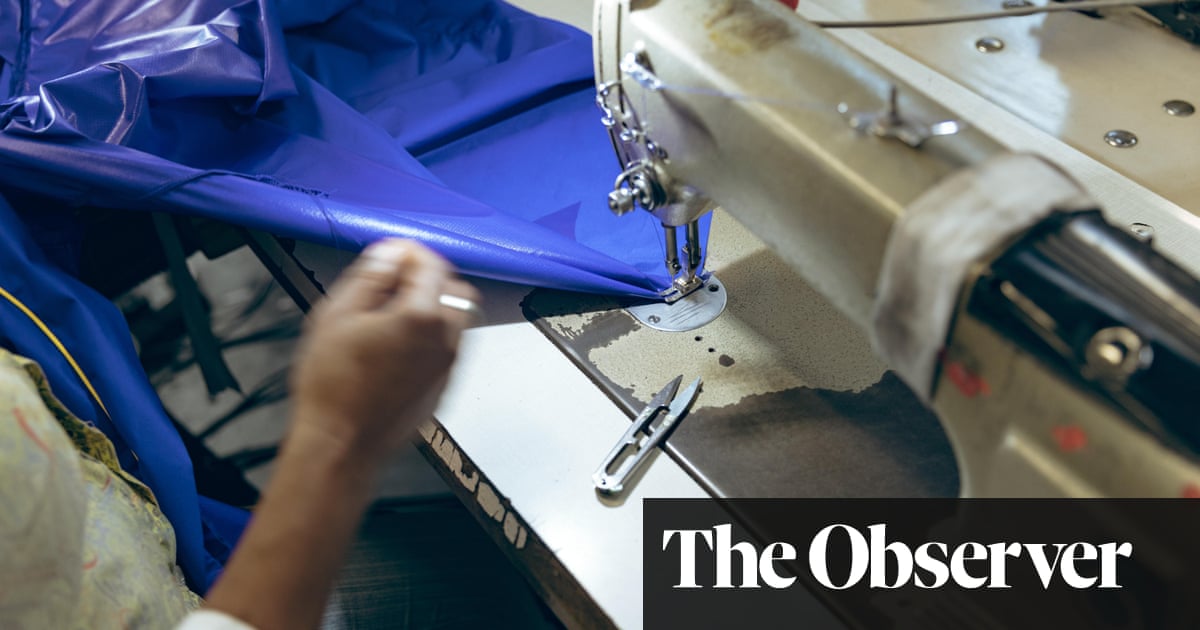
The drivers, who deliver orders for the online retailer’s rapid delivery service, Ocado Zoom, were previously guaranteed an hourly wage of £14. But they are not employed directly by Ocado and claim their income plunged after the company brought in a new delivery partner, Ryde, in June.
Faizan Babar, who has been delivering Ocado groceries for more than two years, said he could not afford to take his two young daughters on holiday this year or replace their broken scooter. “I’m making on average £50 on a 10-hour shift. And we pay for our own cars, tax, fuel and insurance out of that. It works out less than £5 an hour. Ocado is treating us like dirt.”
Babar, 30, works from 7am to 8pm some days just to keep up with his bills – anything else is a luxury he cannot afford. “I can’t give any time to my daughters or wife. I can’t even take them on a day out,” he said. “My daughter wants to go to Chessington [theme park] but I can’t afford it. I feel horrible. I can’t talk to her about it.”
Babar said that many of his colleagues had seen their earnings fall by between 50% and 70% since Ryde took over from Ocado’s previous delivery partner.
Payslips seen by the Observer show that Babar earned an estimated £5 an hour in the first week of August and £2.91 an hour in the last week of July. “It’s not enough to survive on. I’m having to claim universal credit,” he said. “Every one of us is struggling.”
The Independent Workers Union of Great Britain (IWGB), which represents the drivers, said Ocado should take responsibility for the plight of a loyal group of workers who carried on working throughout successive lockdowns. “These drivers are key workers who risked their lives during the pandemic delivering vital supplies for Ocado but are now seeing their pay slashed by a company that has seen profits skyrocket,” said Alex Marshall, the union’s president.
“They should be treated as the heroes they are. Ocado needs to take responsibility and bring these workers in-house.”
The union will send an open letter to Ocado this week, accusing the company of abandoning a precarious and predominately minority ethnic workforce. It warns that the IWGB will begin a public campaign against Ocado unless it enters into negotiations. The company reported group profits that rose by nearly £30m to £73.1m in February, but has recently seen sales slip as shoppers return to pre-Covid habits.
But the rapid delivery market is expanding, with huge amounts of venture capital pouring into courier firms attempting to replace smaller top-up purchases made in corner shops with ultra-quick drop-offs, usually within an hour of ordering. Ocado, whose CEO, Tim Steiner, received a £58.7m pay packet in 2019, is planning to roll out Ocado Zoom across Britain, with at least 12 “micro fulfilment centres” due to open.
Ocado, which is half-owned by Marks & Spencer, said: “Ocado Zoom works with a number of third-party suppliers, and expects all of them to adhere to its high standards.”
Ryde, which is backed by some of the world’s largest venture capitalists and high-profile tech investors, said it was a “rider first” last-mile delivery business, with drivers free to work as it best suits them. “We put the welfare of our workforce at the heart of everything that we do,” said a spokesperson.
“On average, workers on our platform earn 15% to 20% more than other gig economy businesses. We constantly champion improved conditions for them across the board.”
Other drivers based at the Ocado Zoom depot have also come forward. Ahmed Fahim, who has been dropping off Ocado groceries since 2019, said he was earning around £200 a week on the Ryde app. “I worked throughout the pandemic because I had to put food on the table. I got Covid when my wife was pregnant. But there is no appreciation or respect for the risks we took for them,” he said. “Ocado treats people like shit.”
Payslips seen by the Observer show that Fahim, who was working 14 hours, seven days a week, earned an estimated £4.63 an hour for the first week in August and £3.80 an hour in the last week of July. Fahim, 27, said he had been forced to cut back on everything apart from essentials to avoid going further into debt or having to use a food bank. “It’s a horrible feeling that you work for a company like Ocado for three years and nobody asks you how you are doing,” he said.
Another driver, Jakaria Rehman, 35, said he was earning around £3 an hour. “Ocado is disgraceful. They say we don’t work for Ocado but we are delivering for them. They don’t appreciate us,” he said.
The drivers have even been made to buy new smart clothes. Ryde specifies on the app that “tracksuits… are not acceptable and may result in you not being able to work the shift”. Babar, who worked throughout the lockdowns despite being classed as clinically vulnerable, said it was yet another expense the couriers were expected to bear themselves. “Jeans and shirts are more than £50, and you need to have at least two or three pairs. It is at least a couple of hundred pounds that we don’t have,” he said.
The size of the deliveries, which can include cans of beer and bottles of wine, is growing, according to the drivers. When the drivers started, they were expected to take groceries that fitted in two courier bags, now it is four bags. They claim they are frequently asked to take even more, with the Observer shown pictures of shopping overflowing from four bags.
“They used to split heavy loads but Ryde is forcing us to take whatever Ocado gives us. Sometimes we get five bags’ worth,” said Babar. “Most drivers have shoulder and back pain.”
One driver has to take painkillers to get through the working day. “Every delivery is at least 30kg to 40kg. If you are making 20 or 30 trips, you are carrying more than 1,000kg every day,” said Fahim. “I have to take painkillers because my back and knees hurt.”
Attempts to to discuss the worsening situation with Ocado and Ryde have proved frustrating for the drivers. “Ocado is hiding behind Ryde. They say talk to your employer, you are nothing to do with us,” said Babar. “But Ryde blame Ocado and say they cannot pay us any more. We have nowhere to go – we keep going back and forth.”












